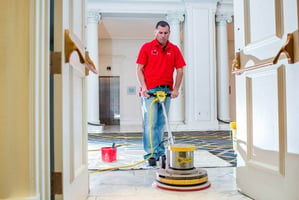In today’s fast-paced industrial environment, maintaining a clean and organized workspace is...
10 Essential Tools and Techniques Used by Professional Industrial Cleaning Services
In the world of industrial cleaning, maintaining a clean and safe environment is crucial for operational efficiency and compliance with health and safety regulations. Professional industrial cleaning services employ a variety of tools and techniques to ensure that facilities are spotless and well-maintained. This article explores ten essential tools and techniques that these services utilize to achieve high standards of cleanliness.
1. High-Pressure Washers
High-pressure washers are a staple in industrial cleaning. These machines use powerful jets of water to remove dirt, grime, and other contaminants from surfaces. They are particularly effective for cleaning large outdoor areas, machinery, and equipment. The ability to adjust the pressure allows cleaners to tackle different types of surfaces without causing damage.
2. Industrial Vacuum Cleaners
Industrial vacuum cleaners are designed to handle heavy-duty cleaning tasks. Unlike regular vacuums, these machines can pick up larger debris and are equipped with powerful motors to handle fine dust and hazardous materials. They come in various sizes and configurations, making them suitable for different environments, from factories to warehouses.
3. Floor Scrubbers
Floor scrubbers are essential for maintaining clean and safe flooring in industrial settings. These machines combine scrubbing, washing, and drying in one process, making them efficient for large areas. They can be used on various floor types, including concrete, tile, and vinyl, ensuring a thorough clean without leaving behind excess water.
4. Steam Cleaners
Steam cleaners utilize high-temperature steam to sanitize and clean surfaces. This method is effective for removing grease, oil, and other stubborn stains. Steam cleaning is also environmentally friendly, as it often requires little to no chemicals. It is particularly useful in food processing plants and healthcare facilities where hygiene is paramount.
5. Chemical Cleaners
While many industrial cleaning methods focus on mechanical processes, chemical cleaners play a vital role in tackling specific types of dirt and contaminants. Professional cleaning services use a range of industrial-grade chemicals designed for various applications, including degreasers, disinfectants, and solvents. Proper training in the use of these chemicals is essential to ensure safety and effectiveness.
6. Personal Protective Equipment (PPE)
Safety is a top priority in industrial cleaning. Professional cleaners are equipped with personal protective equipment (PPE) to safeguard against potential hazards. This includes gloves, masks, goggles, and protective clothing. The use of PPE not only protects the cleaners but also ensures that the cleaning process does not pose a risk to others in the facility.
7. Microfiber Cloths and Mops
Microfiber cloths and mops have become popular in industrial cleaning due to their effectiveness in trapping dirt and bacteria. These materials are highly absorbent and can be used with minimal chemicals, making them an eco-friendly option. They are ideal for cleaning surfaces, equipment, and floors, providing a thorough clean without leaving lint or streaks.
8. Automated Cleaning Equipment
The advancement of technology has led to the development of automated cleaning equipment, such as robotic floor scrubbers and autonomous vacuums. These machines can operate independently, allowing for consistent cleaning without the need for constant supervision. They are particularly beneficial in large facilities where manual cleaning can be time-consuming and labor-intensive.
9. Pressure Washers with Attachments
In addition to standard high-pressure washers, many industrial cleaning services utilize specialized attachments to enhance their cleaning capabilities. These attachments can include surface cleaners, extension wands, and nozzles designed for specific tasks. This versatility allows cleaners to tackle a wide range of surfaces and contaminants effectively.
10. Training and Best Practices
Finally, the effectiveness of industrial cleaning services relies heavily on the training and expertise of the staff. Professional cleaners undergo rigorous training to understand the proper use of equipment, safety protocols, and best practices for various cleaning tasks. Continuous education ensures that they stay updated on the latest techniques and technologies in the industry.
Conclusion
Professional industrial cleaning services play a vital role in maintaining clean and safe environments across various industries. By utilizing a combination of advanced tools and techniques, these services ensure that facilities meet the highest standards of cleanliness and safety. From high-pressure washers to automated cleaning equipment, the right tools can make a significant difference in the efficiency and effectiveness of industrial cleaning operations.
Investing in professional cleaning services not only enhances the appearance of a facility but also contributes to a healthier and more productive workplace. As industries continue to evolve, the importance of maintaining cleanliness and safety will remain a top priority, making these tools and techniques indispensable in the industrial cleaning sector.


